#levantine gods
Text
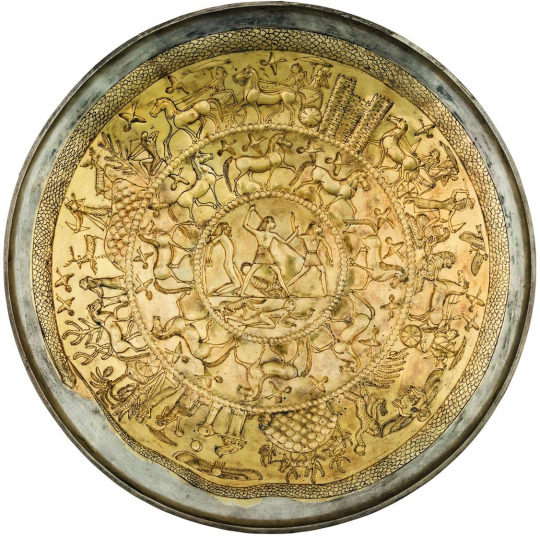
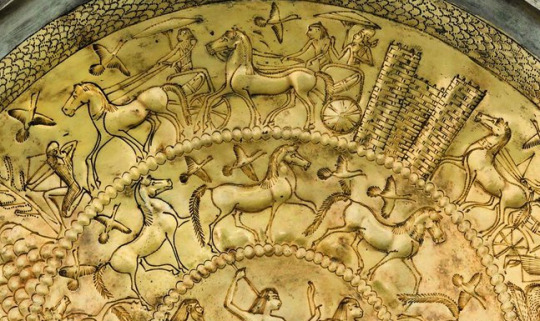
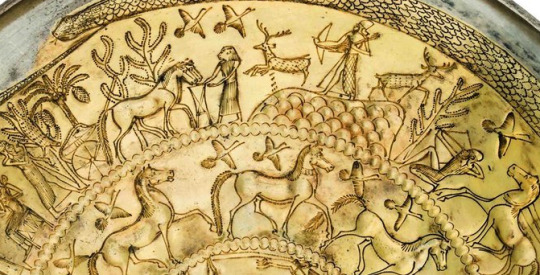
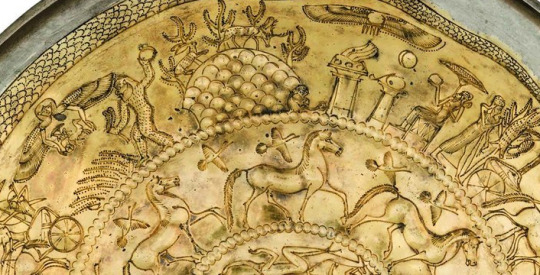
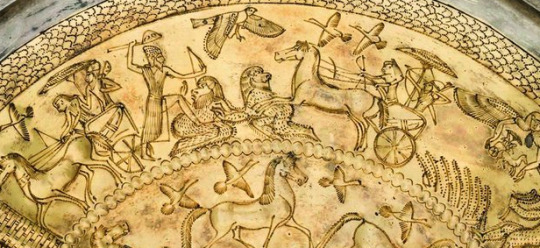
Phoenician Bowl with encircling Serpent
Bernardini Tomb (Palestrina, Italy)
c. 700 BCE
The National Etruscan Museum of Villa Giulia
Rome, Italy
#cyprus#rome#italy#egypt#egyptian gods#canaan#canaanite gods#phoenicia#phoenician gods#aram#aramean gods#syria#syrian gods#levantine gods#mesopotamia#mesopotamian gods#pagan gods#polytheism#archeology#magic#witchcraft#witchblr#paganblr#occult#uroboros#ouroboros#warfare#hunting#soldiers#birds
905 notes
·
View notes
Text
Imagine Altaïr just minding his own business then all of a sudden, he hears one of the recruits go

Altaïr just stops and he's just "????" the entire time while the recruits continue to do their drill.
The Abbas in Trails of series under the cut

#the shock is enough that rauf notices XD#i just think it would be funny if recruits actually think abbas is nice#there's a pro-abbas and anti-abbas faction#anti-abbas faction is led by kadar of course#teecup for the love of god do not think of a lloyd bannings (and the sss) as levantine assassins au#altaïr ibn la'ahad#abbas sofian
16 notes
·
View notes
Text
Lady Asherah (A.K.A. " God's wife") was placed in Solomon's Temple at Jerusalem by King Solomon's son King Rehoboam in c. 928 BCE. Solomon's Temple stood for 342 years and was destroyed in c. 586 BCE by the army of King Nebuchadnezzar of Babylon. Asherah was worshiped in it, side by side with YHVH for no less than 236 years or for more than two thirds of its existence. It was only after the destruction of Solomon's Temple, during the Babylonian captivity that Judaism became an exclusively monotheistic religion. Before that, God had a wife...
God's Wife Edited Out Of The Bible https://www.nbcnews.com/news/amp/wbna42147912
"In Search of Asherah: The Lost Hebrew Goddess - Femmina Classica" https://femminaclassica.com/in-search-of-asherah-the-lost-hebrew-goddess/
"Asherah/Asherim: Bible | Jewish Women's Archive" https://jwa.org/encyclopedia/article/asherahasherim-bible
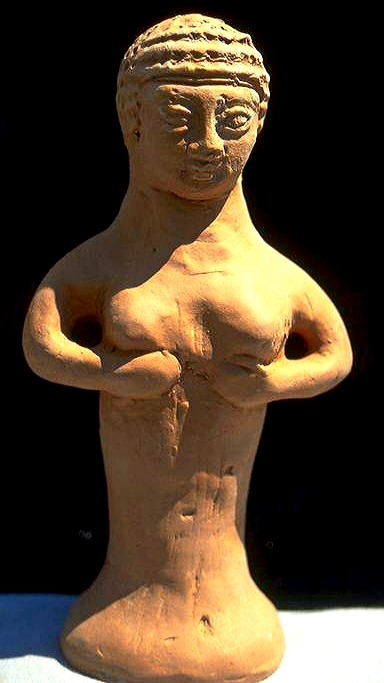
#asherah#pagan witch#witchcraft#witchythings#witchy#pagan wicca#great mother#creator goddess#pagan#levantine pagan#god's wife#co creator#divine feminine#divine female#queen of heaven
102 notes
·
View notes
Text
huge shout-out to the arabs they can each know arabic fluently and still not understand each other how do you do this?
#ik it's not like this really#but im learning arabic and the dialects are making me cry#im focusing on egyptian but emirati sneaks up on me cuz yk#and now there's influencer i 💜 who speaks levantine and im like wHAT DO I DOOO#i am not learning khaleeji so help me gOD#seph.txt
2 notes
·
View notes
Text
“Ashkenazi Jews don’t actually have Levantine genetic ancestry” has been floating around lately among naïve and conspiracy minded anti-Zionists, a problematic claim that undermines actually correct anti-Zionist principles and defense of Palestinian rights. This claim is
absolutely irrelevant, as “blood” originating on the “soil” does not grant anyone any right to an ethnostate on any land. Using area-native ethnicity to justify discrimination and mass killing is bad when it’s Yamato Japanese discriminating against Korean, Mainland Chinese, and Taiwanese minorities in Japan and it’s bad when it’s Celtic-Germanic descent Brits oppressing Celtic-Germanic descent Irish who they’re genetically undifferentiatable from. It was bad when it was Hutus killing Tutsis and it was bad when it was the Khmer Rouge killing Chinese and Vietnamese Cambodians. The actions of the Israeli state in immiserating and slaughtering non-Jewish Palestinians would be equally harmful and wrong if the diaspora had never happened and every Israeli could trace their resident lineage in an unbroken line back to the time of the Second Temple, because it is bad to destroy people’s homes, burn their crops, imprison them, and kill them.
incorrect, at least according to current scientific consensus. Most genetic studies seem to indicate that Ashkenazim are of majority European descent and also have ancestry in the Levant, that is: the Ashkenazi population had some Levantine founders and there’s been significant amounts of intermarriage over the hundreds and hundreds of years of the diaspora into Southern Europe and from there across Central and Eastern Europe.
irrelevant again because even if, through a combination of conversions, adoptions, intermarriage, and adulterous and out of wedlock pairings between Jews and local gentiles, the diasporic European Jewish population had become completely genetically indistinguishable from local gentiles, those Jews would still have been the children of Israel. They still would have learned to read the Torah and celebrate its festivals. They still would have learned, from their families and communities in an unbroken line, to pray “Sh’ma Yisrael, Adonai eloheinu, Adonai echad” (Hear, Israel, the Lord is our God, the Lord is one) as the rabbinic sages of Roman Judea observed in the Talmud that they were commanded to do. They still would have spoken languages with Hebrew and Aramaic elements, and they still would have written them with letters recognizable in the Dead Sea Scrolls. They still would have had the same interests, affirmed daily and yearly, in the land that their people left so many hundreds of years ago.
One formulation of the claim is “Israel bans direct to consumer genetic testing because it shows that (Ashkenazi) Jews don’t have Middle Eastern ancestry”. The Israeli government does ban DTC genetic testing as part of a genetic information privacy and nondiscrimination law passed in 2000, before companies like 23andMe existed. DNA testing for ancestry can be interpreted and presented many ways, and the ancestry breakdowns given by DTC GT companies just do not correspond to the question “where, how, and through what migrations did this population originate?”.
Once again, Zionism is not bad because people residing in places their ancestors are not from is bad. That is fine. Zionism is bad because from its beginning the Zionist project has been one of violent dispossession and because that violent dispossession continues in and through this very present moment.
120 notes
·
View notes
Text
some excellent trees for trans men to kiss under:
Fire trees
Bodhi (very auspicious!! very enlightening!!)
Mango trees.. for the south and southeast asians!!
Olive trees for the Mediterranean and Levantine men
Magnolias
Weeping Willow
Frangipani Rubra
Strangler Figs if you're secretly a forest god
Mimosas ♡
218 notes
·
View notes
Text
Adam - Noah : evemerization of common Levantine folk myths about divinities worshipped by proto-gnostic mysteries. not linked to Temple Hebraism or its predecessor high paganism. thrown in at the beginning, much like the same stories would later be in Christendom, to fill the gap from what the priesly traditions were interested in.
Abraham, Isaac, Jacob, Joseph : rephaim videlicet heroes videlicet ancestral gods of Hebrew paganism.
Exodus & Moyses : an Æneid devised by the priests, building off the claims of some nobility to have once dwelt in the courts of Ægypt. most romantically to be linked to Amosis' overthrow of the Hyksos regime and his measures against its nobles.
Joshua & Judges : various folk heroes and scholarly ætiologies.
Saul, David, Solomon : tragic national epic accrued quite strangely around historical kings; akin to the Matters of France or Britain, or the Serbian Kosovo Cycle.
Later kings : essentially & increasingly historical. the fall to monolatry very likely happened in this period, though I do wonder if Kurush & his Magians might not have a hand in it also. it was established by the time the Second Temple was built at any rate.
source: vibes
38 notes
·
View notes
Text

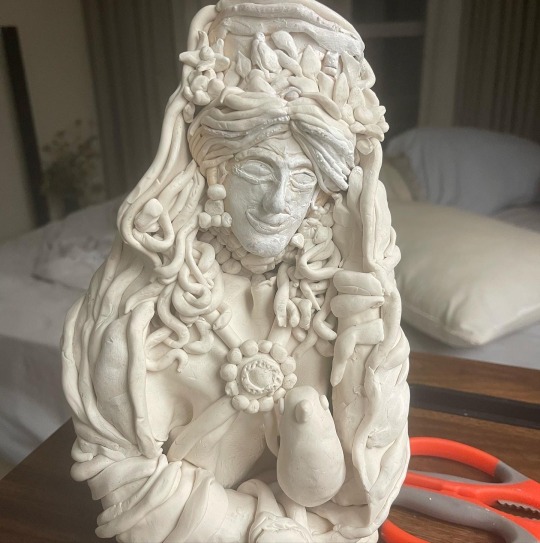
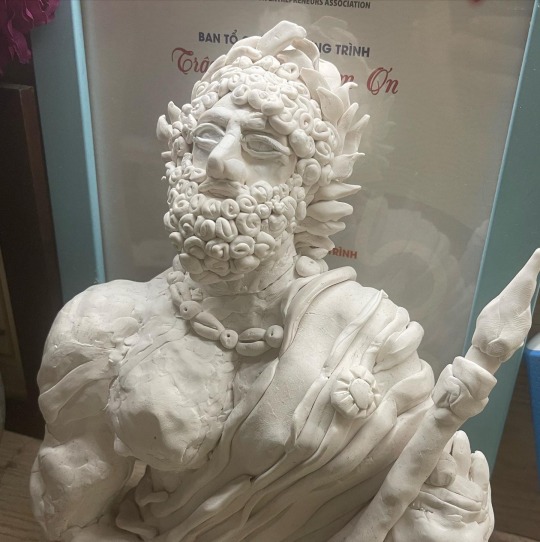
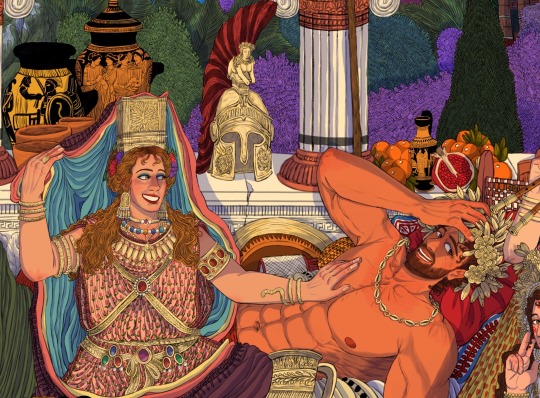
Finally finished sculpting little busts of Aphrodite and Ares, after more than a year of not touching polymer clay that I once used for uni🏛🏺
The stylized depiction of the war god Ares (especially the beard curls) were inspired from the limestone Archaic Greek votive statues of Cypriot bearded priests/ wealthy dignitaries that were found in the temple of Resheph-Apollo in Idalion (modern day Dali district in Nicosia, Cyprus); while Aphrodite herself were inspired from the limestone bas-reliefs of Inanna/Ishtar in Palmyra, Syria, and the famous funerary reliefs of the city’s affluent wealthy citizens over there, too. The exchanging of ideas, beliefs and cultures of the East and West that we can see through various ancient cities in the Levantine region like Palmyra, and Ancient Phoenician/ Greek little jewelry trinkets/ objects always have a soft spot on my heart. ❤️❤️❤️
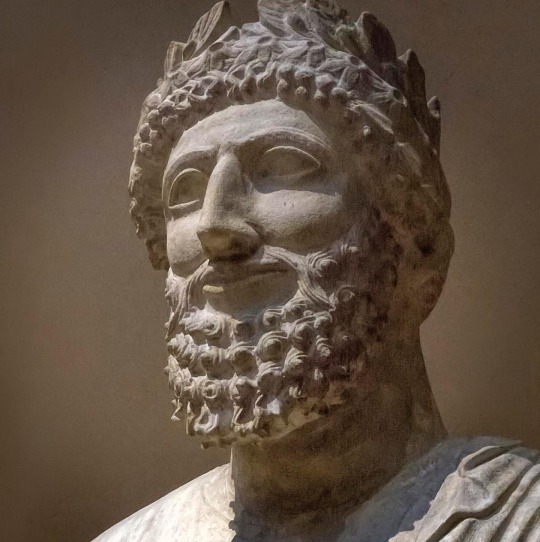

#ancient greek#ancient near east#aphrodite#ares#my art#art history#mars#venus#polymer clay#polymer sculpture#ares and aphrodite
26 notes
·
View notes
Note
If you're Christian isn't the God of Lot's wife omniscient tho?
it's important for christians to see the whole bible as god's revelation, inspired by the holy spirit, speaking to the one same way, truth, and life that is the Word of God himself progressively shown forth through the ages of salvation history.
it's also important for christians to recognize the tanakh as a sacred text for jewish people and respect that tradition of interpretation
and then it's important for anyone who reads the bible to recognize it as a book written by humans in particular times with particular temporally-bound perspectives and understandings of the world: israel does not start out as a monotheistic people-up through the later parts of isaiah traces of polytheism are plentiful; only late do the prophets proclaim that Hashem is the only god who exists, that the idols of the nations do not exist. Most of the old testament is, properly speaking, henotheistic.
so is the God of Lot's wife omniscient to me? yes, insofar as the God being described is the same God I worship. But no, if I'm reading the text attempting to encounter it on its own terms without reading into it.
all these methods of reading are important. i think christians must see both. but it would be dishonest to pretend genesis is--on its own terms--speaking of an omniscient, omnipotent, self-existing Necessary Being in the sense that I understand. the Being it's talking about is all those things of course. but he isn't being presented or understood that way by the text, by the author, and i don't think it's right to erase this other side of God: a "jealous God" who "plucks me out of the mighty waters" with "smoke coming forth from his nostrils," who bargains and pleads with his people, who hasn't lost his traces of early levantine polytheism, and who doesn't necessarily play fair.
10 notes
·
View notes
Text
A gift for @inklingm8 , @spacelazarwolf , @magnetothemagnificent , @atiredjew , @loki-god-of-mischief-13 , @trainqueen379 and @homochadensistm.

This is Schlep, the Israeli National Engine. He's based on a Staedler JT 42BW, and he's very strong, hard-working, brave, and caring about his passengers' safety during his trips from Haifa to Jerusalem.
Likes: Super spicy food, Mizrahi pop music (especially Ofra Haza), the sky at sunset.
Dislikes: When his service is interrupted by missile attacks, sandstorms, anyone who beats around the bush.
Schlep is the grandson of Rivka the Palestine Railways P Class, who was the Levantine National Champion back when Israel was still known as "British Mandate Palestine", until she was succeded by Ofir the EMD G12 in 1959.
#starlight express#stex#stex oc#schlep the israeli engine#my art#my oc#traditional art#jumblr#a small gift for Passover
11 notes
·
View notes
Text

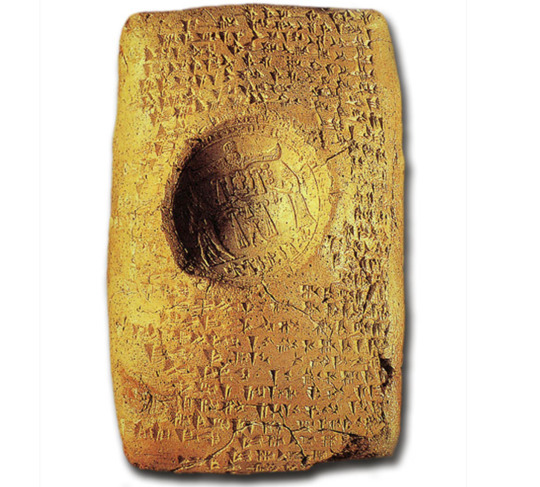
Divorce-Writ of King Ammistamru II
Ugarit, Syria
c. 1250 BCE
A tablet documenting the divorce of King Ammistamru II of Ugarit fromhattusa the daughter of the Amorite king Benteshina, sealed by the Hittite King Ammistamru. The king stands to the right, holding a spear, next to the "Weather God" who holds a club. They are both facing a long-robed female goddess (Arima, the chief Hittite sun-goddess) who stands at the left.
Source: Virtual Museum of Syria
#ugarit#hittite#baal#hadad#ugaritic costume#arima#sun goddess#huttusa#hittite gods#canaan#canaanite gods#phoenicia#phoenician gods#aram#aramean gods#syria#syrian gods#levantine gods#mesopotamia#mesopotamian gods#pagan gods#polytheism#archeology#magic#witchcraft#witchblr#paganblr#occult
266 notes
·
View notes
Note
An AU idea where, after Ezio fist fights the pope and enters the vault, there is no Minerva waiting for the prophet with a message, just a naked Desmond, unconscious on the floor, lined like an Apple of Eden with no memory of what happened after he touched the eye, and very little memory of what happened before that. He knows his name, he knows he's an assassin, and he knows he died to save the world. But he doesn't know when or where that happened or how he ended up in the vault.
This makes me think about how everyone would react to the mostly used plot point that Desmond and Altaïr share too many similar facial features.
Without Ezio hearing about Desmond’s name from Minerva, all the information he has about Desmond is the following:
His name is Desmond (from Desmond)
He’s an Assassin (from Desmond)
He believes he died saving the world (from Desmond)
Everything else is foggy (implied from Desmond’s ‘I’m not sure’ answers to most of Ezio’s questions)
This vault is meant to hold something very powerful (from Mario)
Only the prophet (him) may open the vault (from Altaïr’s Codex)
God dwells in the vault (from Rodrigo)
Now, a funny conclusion to make would that Ezio’s religious upbringing makes him think Desmond is Jesus (died to save the world + ‘god’ dwells in the vault). XD
Another idea that Ezio could potentially get to using mental gymnastics is that Desmond is related to Altaïr in some way.
Now, the Codex doesn’t specifically say who Altaïr’s sons are. To be more specific, what his son’s names are sooooo…
Ezio could believe that Desmond is Altaïr’s son.
This would make sense in his mind on why Altaïr seemed to know about the vault and why he’s invested in it but hid it in his Codex. Desmond looking a lot like Altaïr also points to this.
His working theory is that Desmond had sacrificed his life to save the world (perhaps it is connected to Genghis Khan in some way? It wasn’t like they had a lot of records about the Levantine Brotherhood anyway) and Altaïr, a father grieving the death of his son, used an unknown Piece of Eden to revive him.
Maybe the revival process took too much time and Altaïr knew he would be dead before his son would wake up.
Maybe Altaïr thought he had failed.
Whatever the reason may be, the revival process happened in the Vault underneath Vatican and Altaïr sealed it off with Desmond either sleeping or healing inside.
And Altaïr left the hidden message to guide a prophet to the vault.
To wake his son and give him another chance of life.
Now, at this point, Machiavelli and Claudia would most certainly think that it’s a stretch. Mario would be more on Ezio’s side since old Assassin family have, at this point, pretty much exaggerated Altaïr’s skills and contributions with hero worshipping that can rival Kadar’s very common among them.
But they would all agree that Desmond needs to be protected and helped.
Also, Desmond could easily wield the Apple and command it without any problems but they are concerned of the way the glowing lines on his body became brighter whenever he uses the Apple so they let Ezio keep it for now.
Now, may I suggest more complication?
Desmond retains all the skills he got from the Bleeding Effect and he also feels a painful ache whenever he looked at Altaïr’s statue, describing it as ‘grief’ or the sense of ‘longing’.
Ezio believes this is another indication of Desmond being Altaïr’s son.
Desmond also says ‘He taught me… my… brother?’ whenever someone asked how he performed a specific Assassin movement or skill that they may or may not know.
Ezio believes Desmond is talking about Altaïr’s other son (maybe even sons) as Altaïr’s Codex did say ‘our sons’, not ‘our son’.
But both of these are actually because of Desmond’s Bleeding Effect. He feels the same grief and longing for both Altaïr and Ratonhnhaké:ton, it just shows more because Altaïr’s statue is right there, knocking in his head the closed stuck door holding all his memories. Calling them ‘brothers’ is more of Desmond’s mind screwing up the idea of ‘ancestors’ with a ‘Brotherhood’ because his Assassin ancestors are all his brothers in the Brotherhood after all.
And, to further screw up Desmond, his memories come in flashes.
But not his memories of Desmond Miles.
His memories of reliving the memories of Ezio Auditore.
For example, the day the Papal Army is about to lay siege to their town, Desmond sees a vision of the town in shambles, of Ezio getting hit and Mario dying.
He doesn’t know the context of any of these.
He doesn’t even know when it will happen.
But Ezio gets everyone to take it seriously because this is a man they found sleeping in a vault that supposedly never been opened before (“Altaïr opened it.” “We don’t know that for certain.”)
Monteriggioni suffered heavy damages but it stood the attack and Desmond’s mastery over the Apple made the Papal Army fight one another.
That’s when Desmond gets another vision.
He has a vision of Ezio with many Assassins behind him… in Rome.
And that is how we kick Ezio to AC Brotherhood’s storyline while keeping Monteriggioni sorta intact and Mario alive… with Desmond acting as his seer but he has to stay with Ezio because he only has visions if Ezio is nearby (although it is pretty random).
#desmond gets mistaken as altaïr’s son#desmond gets mistaken as a seer#when in need of conflict#use one of the most cliche jrpg tropes#give someone an amnesia#desmond becomes a human-poe hybrid#probably#assassin's creed#desmond miles#ezio auditore#altaïr ibn la'ahad#i mean he's talked about a lot so it counts?#ask and answer#teecup writes/has a plot#fic idea: assassin's creed
183 notes
·
View notes
Text
Before the british, the ottomans, who were Turkish, colonised, they’re not indigenous to the Levant so i don’t personally understand the overarching pro Palestine narrative that only wants to acknowledge everything after the Brits.
Jews are indigenous to the land, history and archaeology has proved this.
They returned back to the land they’re indigenous to when given an opportunity by the British. There shouldn’t be an issue with that, the only thing that should be up for debate is the way they handle things.
Palestinians are Arabs, Arabs are not indigenous to the Levant. They’re indigenous to the Arabian peninsula. Really think about how groups outside of the Arabian peninsula came to be recognised as Arab, present-day.
North Africans and levantines are “Arabised”, not Arab. During the Islamic conquests they were forced, by the sword,to convert to Islam and to forsake their ethnicity and culture and to adopt the Arab culture.
Every inch of the Middle East is unified by the Arab identity and Islam, because of Arab Islamic, colonisation. Arabs/muslims colonised the holy land from previous colonisers, they’re not an “indigenous” population.
Arabs, Arabic, nor Islam are native to any inch of the Levant.
This war is overwhelmingly religious.
Islam’s main objective is to proselytise and gain believers, a massive part of that is establishing land. Which they have done in many parts of the world, including the regions I’ve recently mentioned. Their intolerant attitudes towards those outside Islam are flagrant, throughout history and present. So, obviously when they colonised the land, they didn’t feel like sharing.
There’s a pro Palestine narrative that before the British, under Ottoman rule was peak, “Jews and Arabs are besties now”. This is a lie. They lived in a state of dhimmitude. Search “Maimonides dhimmi” “Jews dhimmi” and you’ll find more info.
There were hundreds of thousands of Jews scattered across the Middle East, If the attitudes towards Jews or any other ethnicity or religion were relatively peaceful, where are the thriving communities of non Arab Muslims, in the Middle East? Nowhere. Because Muslims are violent and intolerant and they believe they should be the only relevant ones.
I’m going to be very honest with you right now, aside from horrific deaths and the ways in which Israel stokes the war, this issues root is religion.
Muslims are pissed because they colonised the Middle East and North Africa, establishing their religion and unifying under the Arab culture, and this one piece of land that holds recent significance to them, is something they lost.
Israel speaks Hebrew, not Arabic. Israelis are overwhelmingly Jewish, not Arab. And Judaism is upheld, not Islam.
Due to their intolerance, they cannot digest the fact that Jews authored the bible, they’re the main characters in their book and all of the scriptures and prophets and the God of the bible has been made apparent to them *through* Jews. They are the beginning and end of the scriptures their Jewish forefathers wrote and that intrinsic part of history makes the entire Islamic existence look puny.
It’s kind of difficult to spread the narrative that Islam is the one true religion, that never needed any other legs to stand on when you’re staring a Jew in the face and the historical reality is staring right back at you, confidently.
21 notes
·
View notes
Text

this reminded me I feel we need to make clear that settler colonialism is not the same thing as migration and immigration. The difference of which is many but the point being that indigenousness really only matters in terms of violent displacement and genocide. in context of international power dynamics under imperialism colonialism and exploitation. migration can be a natural human thing and not at all immoral or condemnable or deserving of violence.
this is very important in the israel and palestine discussion and in all genocide denialist conversations. being indigenous did not give german gentiles a right to massacre jewish diaspora and other immigrants. because those immigrants got there as normal immigrants. which is entirely different than the kind of casualties that can befall settler colonists who by virtue of their role are not civilians, they are military outposts that very intentionally recruits family units with inadequate military training put in the line of fire on purpose as a PAWN for sympathy and because family units are the most effective way to root a permanent colonial settlement as proven by the genocide of north america. and who may lose their lives when we resist violent colonialism with violence.
perhaps just as importantly, ashkenazi jewish germans WERE and ARE indigenous to germany, because being the oldest and only ethnic group to a land is a bit of an anthropological myth that doesn't exist. ANYONE who got there through the natural and timeless means of human migration is indigenous, at least in the meaningful contexts of imperial violence and stolen land. ashkenazi jewish people were always indigenous citizens of germany.
similarly, palestinian arabs who trace their earliest recorded ancient origins to the middle of the arab peninsula and migrated to the north of the peninsula to the coastal Levant region are considered indigenous. indeed the hebrews of judea were just as indigenous, if not with even older records to the lands along the coast that are now called palestine! many palestinian christians trace their origins as well to the pre-abrahamic phonecian people and the assyrians. during the abrahamic era, the canaanites who were there just as long as the hebrews were likely arab, phonecian, assyrian and SO MUCH MORE in ethnicity. many of which are non abrahamic ethnoreligious groups i failed to mention and perhaps fall beyond the scope of the hebrew jewish vs muslim arab claims. palestinian jewish people and other levantine jewish people matter just as much as the other indigenous ethnicities such as the palestinian/levantine christians and palestinian/levantine muslims.
and while christians jews and muslims born and raised in other lands do not have AUTOMATIC and TOTALITARIAN CLAIM to palestinian land. they do have every right to IMMIGRATE to palestine. to actual palestine. as equals. under the state of palestine and become citizens.
see jewish americans or russian polish jewish people wanting to move to palestine because it was once the home of their hebrew ancestors is NOT wrong in the slightest. people moving to palestine and having ashkenazi jewish communities and enclaves is NOT the problem. it would be wonderful. but that's not what isreal is. dear god i wish that was all that Israel was or is. that's what the first holocaust refugees to the land WERE. regular immigrant civilians seeking a new home under palestinian law. and as such they were welcomed with open arms. but you know, as equals. not as a siege of viking conquerors literally raping and pillaging because like the manifest destiny english before them and the norse seeking valhallah before that, they believed they were given a divine right to do so. that is not immigration that is an act of war. normal immigration is not war. normal immigration is not a problem. least of all to a place your ancestors used to live. that's lovely. it was the decision to enact an american military organized and funded hostile takeover and murder and enslavement of the other civilians that is the fuckijg problem. hello.
10 notes
·
View notes
Text
"Zeus himself, the central character in Hesiod’s Theogony, bears some of the most easily recognizable Northwest Semitic features, in addition to those of the Indo-European Sky God inherited by the Greeks. It is not necessary, therefore, to discuss them at length. It suffices to recall that the Canaanite Storm God Baal and the homologous Greek god share a similar position in the succession of kings in Heaven, as well as the position of the youngest son. They both reign from a palace on a northern mountain (Olympos, Zapanu/Zaphon), and they wield thunder as their distinctive weapon. As with his Near Eastern counterparts, thunder, lightning, and the thunderbolt were the “missiles/shafts of great Zeus.” The position of his sister and principal consort Hera is like that of Anat, Baal’s sister and partner (though not consort). For some, this coupling “violates the incest taboo” in Greek myth but allows Hera to remain an “equal” partner according to her right of birth, as the daughter of Kronos. In Il. 4.59 she is the oldest daughter, in Il. 16.432,18.352 she is called “sister and wife” and in Hesiod Th. 454 she is the youngest daughter of Kronos, exactly as Zeus is the last son.
The list of similarities between Zeus and the different manifestations of the Canaanite god (either Baal or El or Yahweh in the later Hebrew theology) is long and has been the subject of much discussion by classicists, Semitists, and biblical scholars. Perhaps most interesting are the parallels noticeable at the level of their epithets, such as Zeus the “cloud-gatherer” (nephelegereta)or “lightener” (asteropetes), and the frequent characterization of Baal in Ugaritic poetry as the “cloud-rider” (rkb ʿrpt). Other epithets of the Northwest Semitic Storm God Adad (Haddad) are preserved in Akkadian hymns, such as “lord of lightning” or “establisher of clouds.” …
Zeus’ “high-in-the-Sky” position and Sky-nature are reflected in other epithets such as hypatos and hypsistos. At the same time, similar divine epithets meaning “the high one” (eli, elyon, and ram) are very common in Northwest Semitic religious texts, accompanying several principal divinities. For instance, this epithet is used in the Ugaritic epic for Baal, and different forms of the adjective are attested in Aramaic, as well as in the Hebrew Bible accompanying El, Yahweh, and Elohim. … The association of the Storm God in Syro-Palestine with the bull as a symbol of fertility is also present in the various mythological narratives involving Zeus, most clearly in the famous motif of Zeus’ kidnapping the Phoenician princess Europa and carrying her on his back after taking the shape of a bull.
The final fight of Zeus with Typhon (Th. 820-880) has also been compared to the fight between Baal and Yam (the Sea) in the Ugaritic Baal Cycle and to that between Demarous and Pontos (the Sea) in Philon’s Phoenician History (P.E. 1.10.28). As mentioned earlier, the Storm God’s struggle with a monster also (albeit more distantly) resembles the clash between the Hurrian Weather God Teshub and the monsters Ullikummi, Illuyanka, and Hedammu. The figure of Typhon in Hesiod can in fact be seen as a Greek version of a “cosmic rebel” repeatedly reimagined with different characteristics in the specific versions, who endangers the Weather God’s power and generally has both marine and chthonic features. The Levantine and Greek adversaries probably have more than a merely thematic resonance, as the very name of Typhon might have a Semitic origin. It has hypothetically but quite convincingly been associated with the Semitic name Zaphon. Mount Zaphon (Ugaritic Zapunu or Zapanu) is a central point of reference in the geography and the religion of Ugarit. Known by Greeks and Romans as Kasion oros/ mons Casius (today Jebel al-Aqra), this peak on the north coast of Syria (south of the Orontes River) was also mentioned in Hurrian-Hittite myths. The mountain occupies a central spot in both the fight between Ullikummi and Teshub (as Mount Hazzi) and in the Ugaritic Baal Cycle. In the Ugaritic epic, the fight against Yam (the Sea) is not described as taking place on the mountain, but the celebration of Baal’s victory is, as it is the god’s abode overlooking the Mediterranean: “With sweet voice the hero sings / over Baalu on the summit / of Sapan (= Zaphon).” Much later, Apollodoros locates the cosmic fight with Typhon on Mons Casius precisely, which indicates that the link between Typhon and Zaphon had persisted, even though the name known to Hellenistic authors was the Greek, not the Semitic one."
- When the Gods Were Born: Greek Cosmogonies and the Near East by Carolina López-Ruiz
10 notes
·
View notes
Text
Was Lovecraft Ableist? An Examination of "Lovecraftian Madness", Part 2: The Call of Cthulhu
(Warnings for this post include spoilers for The Call of Cthulhu, and Lovecraft-typical racism as well as period-typical ableism.)
In my last post about Lovecraft, I began an examination of the subject of "Lovecraftian madness" - specifically, how the term is used today, what people believe it to mean, and whether Lovecraft intended it in an ableist and derogatory sense. To figure this out, I decided to look at two of his best known works: At the Mountains of Madness, a story that uses the word "madness" more often than I change my underwear, and The Call of Cthulhu, a story notorious for its plot point of people getting the brain scramblies from seeing visions of an elder god.
Since this is a pretty in-depth topic, I've split it into two posts. In the last one I examined At the Mountains of Madness and its relationship to the infamous word. Based on the context and usage within the story, I determined that while it wasn't without its issues, it had nothing to do with the concept of mental illness at the time and, generally speaking, was not ableist of Lovecraft to use.
So what about the story that started it all? And I don't just mean "Lovecraftian madness" - I mean evil cults trying to summon their apocalyptic gods, the aforementioned and legendary brain scramblies, and the introduction of the Mythos' most iconic and misunderstood character, Cthulhu* himself.
Well, The Call of Cthulhu is already notorious for its disturbing levels of racism, so it wouldn't be terribly surprising to find out that it was ableist as well. What did surprise me is that, contrary to the insistence of many of Lovecraft's fans... not once did he describe the phenomenon that everyone is familiar with as "madness".
So, what did he call it? Well, the story features a diverse assortment of terms and euphemisms. A few of the choicest entries:
The (newspaper) cuttings largely alluded to outré mental illnesses and outbreaks of group folly or mania in the spring of 1925.
On March 23d, the manuscript continued, Wilcox failed to appear; and inquiries at his quarters revealed that he had been stricken with an obscure sort of fever and taken to the home of his family in Waterman Street… …Reference to this object, the doctor added, was invariably a prelude to the young man’s subsidence into lethargy. His temperature, oddly enough, was not greatly above normal; but his whole condition was otherwise such as to suggest true fever rather than mental disorder.
The subject, a widely known architect with leanings toward theosophy and occultism, went violently insane on the date of young Wilcox’s seizure, and expired several months later after incessant screamings to be saved from some escaped denizen of hell.
Mental illness, mental disorder, and violent insanity. Yikes.
But he doesn't stop there. Having pathologized the hell out of anyone affected by this phenomenon, Lovecraft goes on to take potshots at some of his least favorite people:
Voodoo orgies multiply in Hayti, and African outposts report ominous mutterings. American officers in the Philippines find certain tribes bothersome about this time, and New York policemen are mobbed by hysterical Levantines on the night of March 22–23.
From what I've been able to glean, "Levantine" is a general term referring to people from the Levant region, but this being Lovecraft, he may in fact have been referring to Jewish people - I have no way of knowing for sure.
He gives us a parting shot at the mentally ill, for good measure:
And so numerous are the recorded troubles in insane asylums, that only a miracle can have stopped the medical fraternity from noting strange parallelisms and drawing mystified conclusions.
Now, before I continue, there are a couple of things that I want to make note of. First, while Lovecraft's hatred for minority races went above and beyond the norms of his time, many of his prejudicial beliefs were standard, and that includes the way he talks about mental illness in this story.
Second, Lovecraft's relationship to the entire concept of mental illness was both deeply personal and fraught with torment. Lovecraft's own parents were institutionalized at different points, and he himself suffered from what may well have been an undiagnosed anxiety disorder, as well as possible issues with emotional dysregulation, and a sensitivity to stress that profoundly impacted his mental and physical health. This, in turn, contributed to an unhealthy preoccupation with the concept of mental illness, specifically the fear that he would succumb to the same fate as his father.
Essentially, what I'm saying is, this isn't a scathing indictment on his character in the way that his racism was. However, what this does not change is one simple, undeniable fact:
The Call of Cthulhu, and the associated notion of elder gods melting your brains with their mere presence, is rooted in ableism.
This entire story describes some kind of mental plague that disproportionately affects people like Lovecraft himself - the emotionally sensitive, the mentally ill, and so on. While we can take this as the internalized ableism and self-deprecation that it was, it was still an exhibition of bigotry toward the neurodivergent.
And despite people's best intentions, changing "mental illness" to "madness" does not magically erase that fact. And anyone who tries to tell you that Lovecraft never intended it to be about mental illness, it was just alien influence, I swear! is either lying, or in desperate need of a reread of this story.
Now, that doesn't mean that there aren't ways to make this concept less shitty. You could get away from the whole 'mental illness' thing and lean into the Psychic Exposure To Alien Minds angle - provided you're careful not to produce some tacit implication that some people are just weaker minded, as Lovecraft did. Or you could go the Mountains of Madness route and not talk about psychic aliens at all, just the consequences of stress and trauma on the human mind.
But what doesn't work, and what doesn't help anyone who suffers from mental illness, is to pretend that the ableism was never there. That's never going to be true, however fervently we can wish it was.
*Pronounced Ckhloo-loo, if you're a Mythos purist. Neat little tidbit I picked up while researching on www.hplovecraft.com.
5 notes
·
View notes